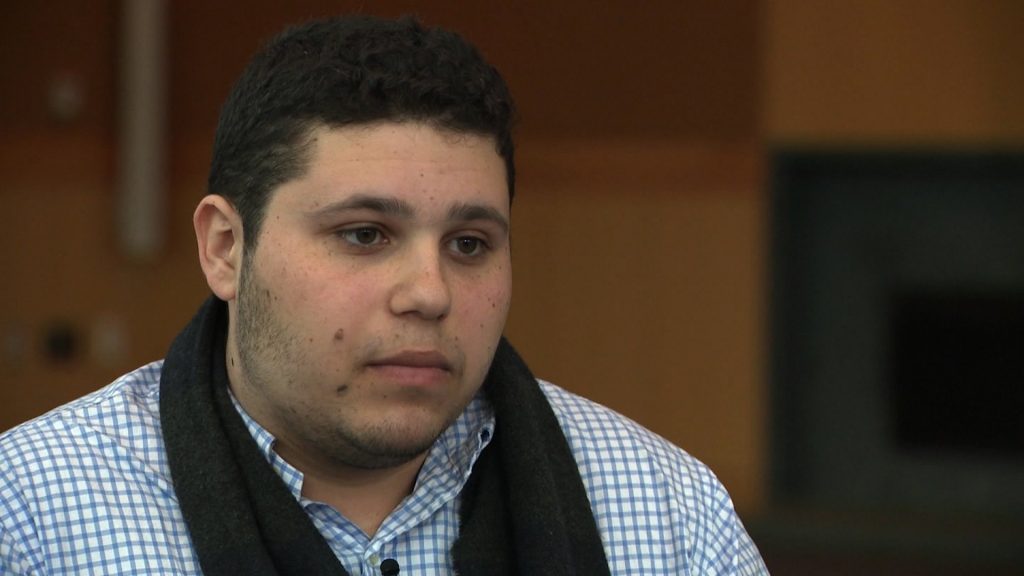Trump administration poses threat to undocumented students under DACA program
Krop alumni Elias Rosenfeld is interviewed by reporters at WSMV-TV to discuss his childhood as an undocumented student. Rosenfeld now attends Brandeis University where he continues to speak about protecting programs like Deferred Action for Childhood Arrivals(DACA).
750,000 undocumented immigrants protected by Deferred Action for Childhood Arrivals, (DACA), in the United States face an uncertain future.
DACA temporarily protects eligible young immigrants brought into the United States by their parents from deportation.
DACA enrollees, or DREAMers, can obtain a work permit, social security number, driver’s license and credit card. Through DACA, these youths can support themselves and their families.
The main requirements for the current program are to be at least 15 years old, have entered the U.S. before the age of 16, lived in the U.S. from June 15, 2007 to the present and are under the age of 31 as of June 15, 2012. DACA status lasts for two years and can be renewed. If an enrollee is convicted of a felony or significant misdemeanors, they will be removed from the program. Immigrants in DACA must receive advance parole, a special document, before leaving the country so that they may be allowed to return.
“Imagine you’ve done everything right your entire life — studied hard, worked hard, maybe even graduated at the top of your class — only to suddenly face the threat of deportation to a country that you know nothing about, with a language that you may not even speak,” President Obama said in his speech announcing the new DACA program in June of 2012.
During his campaign, Trump promised to crack-down on immigration and overturn DACA. His opinion seemed to change when he told ABC News in January that undocumented immigrants “shouldn’t be worried,” and that he has a “big heart.” In a news conference he said, “DACA is a very, very difficult subject for me, I will tell you.”
Whether changes will be made to the DACA program, provides for an uncertain future.
Trump said federal enforcement agencies are not going after dreamers, but criminals. While not being directly targeted for deportation, some DACA recipients who have committed misdemeanors previously protected under the Obama policy have been detained or had their status revoked.
23-year-old Juan Manuel Montes, who came to the U.S. at age nine, was the first DREAMer to be deported on February 18. United We Dream, an organization that is led by young immigrants and advocates for their fair treatment, reports that 10 DREAMers are currently in federal custody.
DACA students also fear the deportation of family, friends and other figures of emotional and financial support.
Krop alumnus Elias Rosenfeld understands the fears faced by DACA enrollees as he has experienced them first hand.
Rosenfeld emigrated to the U.S. from Venezuela in 2009. He was seven years-old and entered on a visa, which depended on his mother’s work visa. When his mother died of cancer a few years later he moved in with his undocumented father. Rosenfeld also became undocumented but didn’t realize it until ninth grade at Krop when he attempted to get a learner’s permit.
“This was obviously a time of sadness, but it meant more to me as I had always sought to pursue public policy and law in the future,” Elias said.
Since DACA was created in 2012, it has provided protection for Rosenfeld. He is now 19 and a DREAMer attending Brandeis University.
“(Being undocumented) has also gifted me with a societal purpose rooted in our political system, with a personal cause to passionately fight for,” Elias said.
Around 65,000 undocumented immigrant students graduate from high school every year and many are protected by DACA. In an online survey of DACA recipients in 2015, 92% of those in school said DACA allowed them to pursue educational opportunities they formerly would not have been able to.
While DACA is improving the lives of young undocumented immigrants, it does not provide a lawful path to citizenship — only temporary protection from deportation.
Reintroduced several times, at first in 2001, the Development, Relief and Education for Alien Minors (DREAM) Act would provide a lawful path to citizenship, but has consistently failed. DACA enrollees are called DREAMers because most of them would be eligible for the DREAM Act.
The future is unclear for DREAMers, but teachers and students are working to help these undocumented immigrants to build a better life in this country. MDC campuses have hosted free “Know Your Rights” sessions given by Americans for Immigrant Justice. Individual consultations and scholarships are also available for DREAMers.


